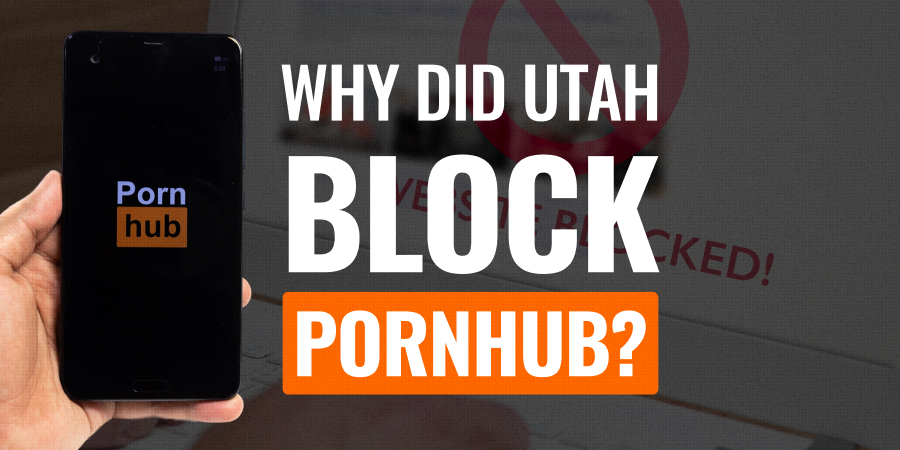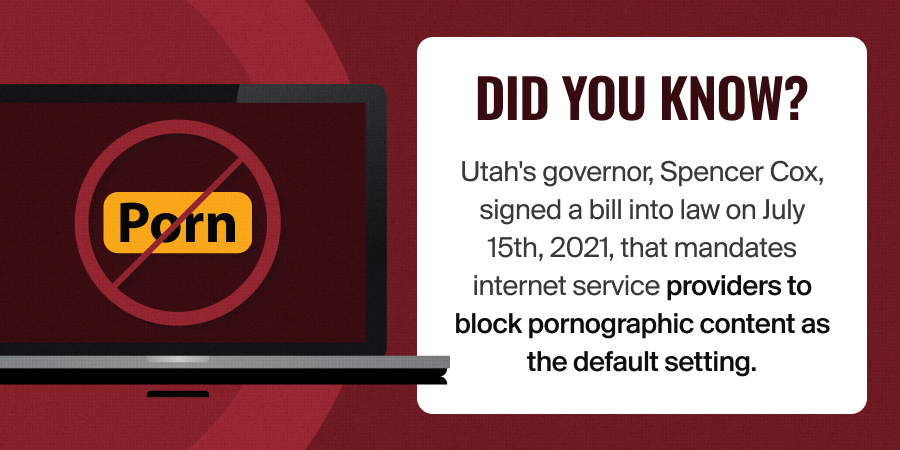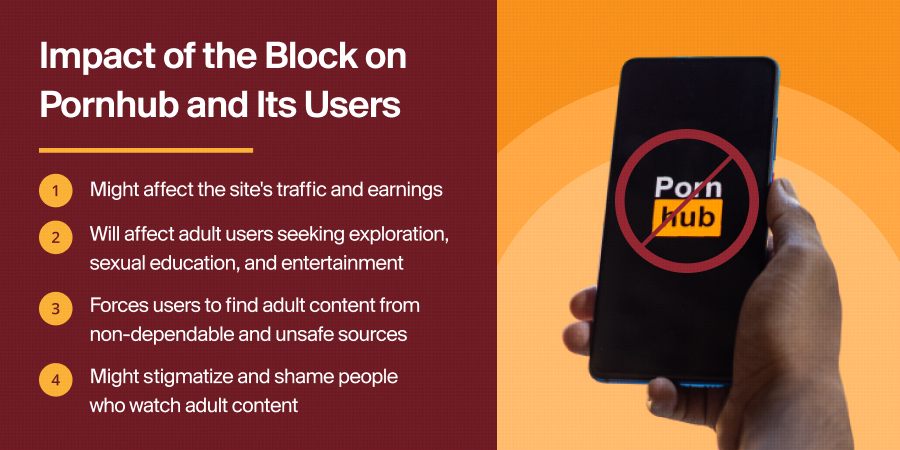
Utah, a state known for its conservative values, recently made headlines for blocking access to adult cam sites such as Pornhub. This decision has sparked debates on censorship, morality, and internet freedom. So why did Utah block Pornhub? Some believe it is necessary to protect children and families from harmful content. In contrast, others view […]
Utah, a state known for its conservative values, recently made headlines for blocking access to adult cam sites such as Pornhub. This decision has sparked debates on censorship, morality, and internet freedom. So why did Utah block Pornhub?
Some believe it is necessary to protect children and families from harmful content. In contrast, others view it as a violation of free speech and an attack on the rights of adults to access legal material.
This article will explore the reasons behind Utah’s decision, the arguments for and against the ban, and its implications for online content regulation.

Utah’s governor, Spencer Cox, signed a new bill into law on July 15th, 2021. The bill, titled SB-0089, requires internet service providers to block pornographic content by default.
Republican State Senator Todd Weiler sponsored the bill, stating that it’s essential to safeguard minors from harmful content. Weiler explained that exposure to pornography can lead to risky sexual behavior, addiction, depression, and even make children vulnerable to sex trafficking.
The American Civil Liberties Union (ACLU) and the Electronic Frontier Foundation (EFF), two civil liberties organizations, fiercely opposed the bill, claiming that it violated the First Amendment and would do little to stop minors from accessing pornographic material.
Additionally, they emphasized how challenging it would be to enforce the law and how much money it would cost internet service providers. Despite these reservations, the Utah legislature approved the bill and made it law by Governor Cox.
The bill’s supporters claim that it is vital to safeguard children from exposure to harmful and explicit material. They support their argument by referencing studies that suggest that viewing pornography can have adverse effects on children’s mental health and behavior.
Furthermore, they contend that parents should have the authority to regulate their children’s online exposure and that it is the government’s responsibility to protect minors from harm.
On the other hand, opponents of the bill argue that it is a moralistic and discriminatory measure that violates the right of adults to access lawful and consensual content.
They highlight that the bill does not differentiate between various forms of pornography and would restrict access to educational and artistic material.
Additionally, they assert that the bill is unlikely to prevent minors from accessing pornographic content, as children can easily evade the blocks by using a VPN or accessing the content from another device.
Unblock All Sites Now With Norton VPN

The recent block on adult websites, including Pornhub, will considerably impact the adult entertainment industry and its users. As one of the largest adult websites globally, Pornhub has millions of daily users and generates billions of dollars in revenue annually.
The block will deny Utah residents access to the site, which could significantly affect its traffic and revenue.
Moreover, many adult users rely on Pornhub for sexual education, exploration, and entertainment; the block will also affect them. It may result in users seeking other sources of adult material that may not be as reliable or safe as Pornhub.
Additionally, it could stigmatize and shame individuals who consume adult content, potentially damaging their mental health and well-being.
Several states, including South Carolina, Rhode Island, and Virginia, have banned pornography by passing laws that mandate internet service providers to block such content. Utah is just one of them.
However, these laws have not successfully kept minors from accessing pornographic content and have faced legal challenges.
Additionally, there have been several attempts to ban pornography at the federal level. One such attempt was the Communications Decency Act, passed by Congress in 1996. This act made it illegal to distribute indecent material online.
The Supreme Court invalidated the law as it was deemed to violate the First Amendment. In 2018, Congress enacted two new laws, the Fight Online Sex Trafficking Act (FOSTA) and the Stop Enabling Sex Traffickers Act (SESTA), to combat online sex trafficking.
However, these laws have faced opposition due to their potential impact on consensual adult content and have been contested in court.
Utah’s recent ban on adult content has sparked a debate about censorship and freedom of speech. Supporters of the ban believe that it is necessary to safeguard children and families from harmful content.
They argue that children can still access adult content by disabling the block or using a VPN without infringing their First Amendment rights.
On the other hand, critics of the ban claim that it violates the First Amendment and infringes on the rights of adults to access legal and consensual material.
They also warn that the ban sets a dangerous precedent for government control of online content and could be used to justify censorship of other types of content, including political and religious speech.
The recent prohibition on adult content in Utah has brought attention to technology’s role in controlling online content.
As per the law, internet service providers must block pornographic content by default, transferring the responsibility of monitoring online content from individuals to service providers.
This development has raised significant concerns about technology companies’ role in regulating online content.
Some individuals believe that these corporations must shield their users from damaging content. However, others argue that it is not their responsibility to determine the acceptability of content.
Additionally, these individuals highlight that the algorithms employed by these companies to regulate content can be discriminatory and incorrect, suppressing lawful and consensual material.
Unblock All Sites Now With Norton VPN
If you live in a state where access to Pornhub has been blocked, you should consider using a VPN to bypass the content filters imposed by the government. A VPN can allow you to connect to a server in a different location where Pornhub is accessible.
However, ensure you use a reputable VPN service that does not log your online activities. Various safe and secure VPNs are available to prevent data leaks even if the VPN connection drops.
It’s essential to understand your right to access Pornhub; hence, if you choose to use a VPN to bypass the ban, use a reputable service that prioritizes your privacy.
Opponents of the block have pointed to many factors that make the bill ineffective and have expressed their concerns about civil liberties being infringed upon by the bill. There are several other ways blocks can happen that don’t go as far as banning it on a government level.
Alternative approaches to completed blocks such as parental controls, age verification systems, and education and awareness campaigns are suggested to address the issue of minors accessing pornographic content.
Parental controls enable parents to restrict access to specific websites and materials on their child’s devices. Similarly, age verification systems require users to prove their age before accessing adult content.
Educating and raising awareness among parents and children about the dangers of accessing pornographic content and how to stay secure online can be beneficial.
Utah’s recent move to block adult content has sparked mixed reactions and criticisms. Those who support the ban argue that it’s crucial to safeguard children and families from harmful material.
They also assert that the ban doesn’t violate the First Amendment since individuals can still access adult content by turning off the block or utilizing a VPN.
On the other hand, critics of the ban contend that it infringes on the First Amendment and encroaches on the rights of adults to access lawful and consensual content.
The individuals also contend that the prohibition is biased and disparaging towards adults who engage in lawful and consensual material.
Additionally, certain detractors have observed that the ban is improbable to deter minors from accessing pornographic content since youngsters can easily evade the blocks by using a VPN or accessing the content from another device.
Unblock All Sites Now With Norton VPN
Utah’s ban on adult content has sparked a debate on censorship, morality, and internet freedom. So with such outrage from both sides, why did Utah block Pornhub and other adult sites?
While some believe it is necessary to safeguard children and families from harmful material, others view it as a violation of free speech and the rights of adults to access legal and consensual material.
Several alternative approaches can be explored to address this issue of minors accessing pornographic content. As technology evolves, the debate on online content regulation will likely persist, and new challenges will emerge.